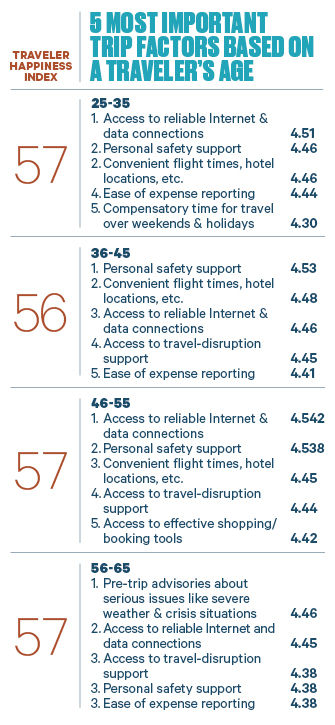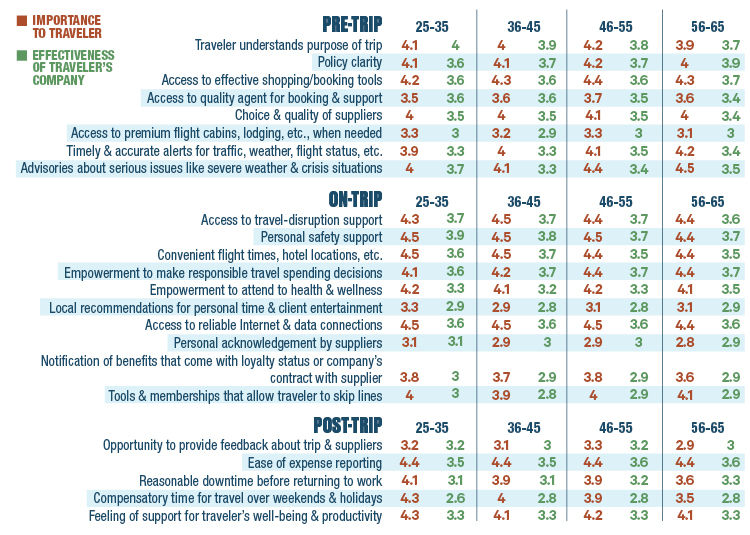
Business travelers
across all age groups have more in common than what sets them apart. In BTN's 2017 Traveler Happiness Survey, younger
travelers showed more desire for personal time as compensation for travel,
while older travelers expressed a greater need of support during travel
disruptions. What's more, personal safety and access to reliable Internet and
data connections surfaced among the top five most important trip factors for
all age groups. Three other factors appeared across three groups. Clearly,
travel buyers have an opportunity to boost traveler satisfaction across
generations by concentrating on just a few areas.
The Common Threads
Reliable Internet
topped both the 25-to-35 and 46-to-55 groups' lists of most important trip
factors and cracked the top three of the other age groups. The gap between how
important travelers said it was and how effective they perceived their
companies to be at it was nearly a full point across all groups.
Of course, much of
that is out of buyers' control. While they can negotiate or reimburse for Wi-Fi
for travel, there is little they can do when a supplier has Wi-Fi issues. "[A]
meeting I just went to was on Amtrak, and there is free Wi-Fi, but it's not
great Wi-Fi," a 52-year-old university employee said. "I had the
intention of taking an hour and a half on a train and catching up on some
things, and the Wi-Fi was in and out."
Highest-Impact Opportunities
Beyond the
importance that travelers place on certain parts of the business travel
experience, as BTN lists in the table above, it also matters how well companies deliver on those priorities.
Consider the 36-to-45 age group, for which detailed data is available in the
Traveler Perceptions table at bottom. In the on-trip category, that age group
ranked four trip factors as 4.5 on a five-point importance scale. They also
rated their companies' delivery at 3.8 for one of those, 3.7 for two others,
and 3.6 for the last. It's that 0.9-point gap for reliable Internet and data
connections that represents the biggest opportunity to improve the on-trip experience
for 36- to 45-year-olds.
The most important factors with the biggest gaps between
importance and delivery are your biggest opportunities. Dig around in the
Traveler Perceptions table at the end of each Travel
Program Opportunities story for more.
Some employers allow
travelers to use data plans to create hotspots from their mobile devices.
Suppliers also often allow higher-speed access at a premium, so allowing or
negotiating that could boost traveler satisfaction.
Internet access
factors into travelers' productivity, and while a company's support of
productivity on the road did not rank in the five most important trip factors
in any age group, it still ranked relatively high across all. Also, the gap
between importance and effectiveness was about one point across the board. Some
travelers said cost-savings policies have made it difficult to work in the air
even if they have Wi-Fi. "In economy class, not having enough space to
spread out and get some work done is frustrating," a 41-year-old
manufacturing industry executive said. "I had to petition my company to
give me a smaller laptop because I wanted to be able to work more on planes."
Personal safety was
the other high scorer among all age groups, and the youngest travelers had the
smallest gap between importance and efficiency. A 26-year-old media employee
told BTN her company required her to check in every so often when she traveled
to a neighborhood in Chicago that had a history of violence. "I feel like
if I ever had any worries about safety, they would totally accommodate me,"
she said. "They were way over-cautious when I was in Chicago, but I
appreciated it."
Convenience
similarly scored high in importance across all age groups. Convenient flight
times, hotel locations, etc., for example, was among the five most important
factors for all groups except ages 56 to 65, where it was close. The same was
the case for ease of expense reporting, which scored essentially the same
across all groups. A 36-year-old attorney who still faxes receipts manually and
has to prove exceptions for missing receipts, even for a parking meter, said
expense reporting was among her biggest pet peeves in business travel. For many
younger travelers, the automated experience is all they know. "It's just
magical," a 28-year-old media employee said of his automated expense
reporting tool, Concur. "The mobile app can get occasionally glitchy … but
otherwise, I enjoy the experience."
Travel's Fading Luster
For younger
travelers, the newness of travel can can boost traveler satisfaction, but that
does not always last. "When I was much younger, the travel was more
exciting and I enjoyed it more, but it's been a slow change to more of a
mediocrity," a 61-year-old electrical engineer said. "I don't
particularly enjoy it, but I don't particularly mind it. It's one of those
things you have to do."
Of course, the
longer one travels, the more one is exposed to the occasional hassles, which
can add up. Travel disruption support ranked in the five most important factors
across all age groups except 25 to 35, though that group scored it relatively
high, as well. Pre-trip travel advisories about serious incidents, however,
ranked as the most important for travelers ages 56 to 65, and it had a gap of a
full point between importance and companies' efficacy. Travelers ages 36 to 55
also scored it as relatively important, while younger travelers considered it
much less so.
"Anyone who travels
for work likes it in the beginning, but then it gets burdensome," said a
46-year-old telecom training director. He also wished for more notice for trip
disruptions. "It always seems that if you have a canceled flight, they don't
tell you until you're at the airport. It also seems that if you have a gate
change, they don't push out the text message fast enough for you to get from
one gate to another."
Such communication
can build travelers' respect for well-managed programs. A 41-year-old HR
manager who recently left a large company to form her own said she misses
trip-disruption support most. "I called the travel agency, and they
figured it out," she said. "I don't have to be on the phone with
JetBlue for five hours. They'll handle it, and it's not a problem."
Older travelers also
simply can become numb to travel. "We have a lot of younger folks,
first-year analyst associates, and they really like traveling," said a
39-year-old investment bank director who views travel as a duty before
pleasure. "They think that traveling's really fun, and I tell them all the
time [that] travel is a privilege of working. It's not like a 4-H Camp."
Reclaiming Their Time
The biggest
opportunity for a travel program was represented by the 1.7-point gap between
how important 25-to 35-year-olds view compensatory time for business trips that
span a holiday or weekend and how well they think their companies deliver on
that premise. As travelers aged, they viewed that factor as significantly less
important; 56- to 65-year olds ranked it among the least important. Similarly,
among older travelers, the expectation of downtime after travel declined.
A 31-year-old
portfolio director praised her company for allowing leisure travel time to be
tacked on to the end of work trips. "You work hard while on a work trip,
but my department was very good at rewarding you for hard work," she said.
"So it was acceptable to take a day, afternoon or whole weekend to enjoy
whatever city you were working in once the work is done." A 70-year-old
advertising rep, on the other hand, often passed up the chance for extra time
off after travel. "I understand that I'm here because the company has a
need, and being the loyal employee that I am, I show up every day and I do the
job that the company asks me to do. I've left vacation time on the table, but
that's me; everybody's different. I have always felt that I've been able to
take additional time off, but I just haven't."
Of course, those in
the youngest group also are most likely to be new parents, and several said the
birth of a child or being away from a spouse made the work-life balance
significantly harder. A 39-year-old consultant said long international trips
were especially hard, though technology has made it easier. "FaceTime has
helped a lot actually with that. It used to be so much more expensive or just
harder," he said. "It has a little bit of an impact on my partner. We've
been together for 15 years, so he's not going to die if I'm gone for a week."
Some travelers said
business travel provided a welcome change of routine. "A lot of my mundane
Groundhog Day is [broken up] whenever I can say, "OK, it's the third
birthday party [I've had to take my daughter to], but tomorrow I'm flying first
class to New York City and we're all having a big party on a rooftop," a
39-year-old energy industry executive said. "It's a nice break."
Traveler Perceptions on a Scale of 1 (bad) to 5
(good)
